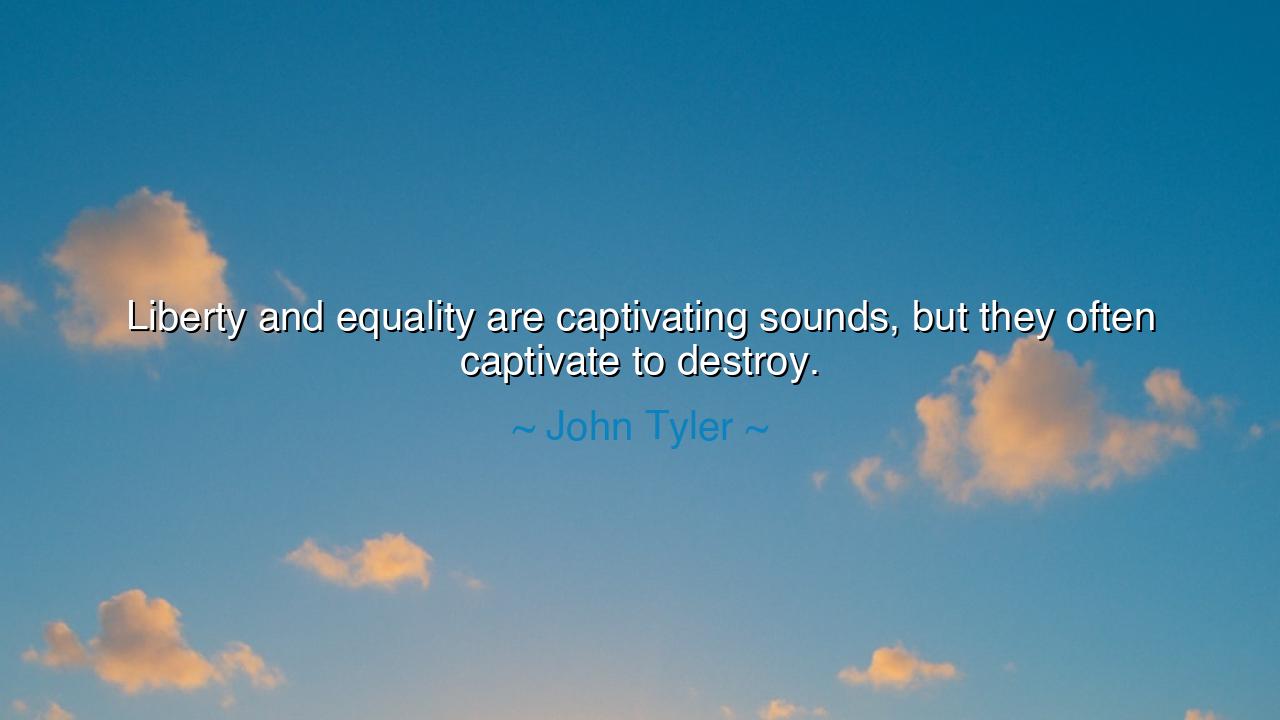
Liberty and equality are captivating sounds, but they often






“Liberty and equality are captivating sounds, but they often captivate to destroy.” These words of John Tyler, the tenth President of the United States, resound with a somber wisdom drawn from the fires of history. They speak to the paradox of noble ideals — that even the purest virtues, when pursued without restraint or understanding, can lead to ruin. Liberty and equality are among humanity’s highest aspirations; they have inspired revolutions, toppled tyrants, and stirred the hearts of generations. Yet Tyler warns that when these ideals are stripped of balance, when they become slogans divorced from moral order, they no longer liberate — they consume.
The ancients understood this duality well. They taught that every virtue, when taken to excess, becomes a vice. Liberty, untempered by law or responsibility, turns to chaos. Equality, when forced beyond justice, becomes tyranny of the mob. Tyler spoke from a nation still young, trembling between order and anarchy. He saw how revolutions born of noble intent — such as the French Revolution — began with the cry for freedom, yet descended into blood and terror. The same passions that liberated the oppressed also unleashed the fury of destruction, for freedom without wisdom becomes a storm that spares no one.
Consider the tale of Robespierre, once the voice of virtue in France’s struggle for liberty. He spoke of equality, of justice for all men, of the rights of the people. Yet, blinded by his own vision of purity, he turned the Revolution’s blade upon itself. Under the Reign of Terror, thousands perished — nobles, peasants, thinkers, and patriots alike. The cry of liberty that once lifted France became the scream of madness. This is the danger Tyler foresaw: that when ideals are worshipped as gods rather than guided as principles, they become idols of destruction.
The power of liberty lies not in freedom from all restraint, but in freedom governed by conscience. The strength of equality lies not in sameness, but in justice — the recognition of worth without the denial of difference. A society that demands absolute equality risks leveling all excellence; a people that seeks boundless liberty risks losing all stability. Tyler’s warning, then, is not a rejection of these ideals, but a call to wisdom and moderation — the sacred balance that sustains nations. For liberty must walk hand in hand with duty, and equality must rise alongside merit, lest both devour the civilization they were meant to ennoble.
There is also within his words a timeless insight into the human heart. Men are easily captivated by beautiful words, especially when those words promise deliverance. But beauty without truth is deceit. Many have rallied under the banners of freedom and equality, only to find themselves enslaved to new masters — ideology, greed, or vengeance. The cry of “liberty” can be twisted to justify conquest; the call for “equality” can be used to suppress individuality. The wise, therefore, do not fall in love with the sound of virtue, but seek the substance beneath it.
History itself offers countless mirrors of Tyler’s wisdom. The fall of ancient Athens, once the beacon of democracy, came not by invasion but by the corruption of its own freedoms. Citizens, intoxicated by liberty, forgot discipline; demagogues promised equality while sowing division. In time, Athens devoured itself from within. The same pattern has haunted empires and republics alike: when freedom forgets its limits and equality forgets its meaning, both become tools of ruin.
So let this be the lesson, passed down as from elder to youth: beware the glitter of unguarded ideals. Let liberty be guided by virtue, and equality by justice. Seek not the music of words, but the harmony of truth. A free people must be wise, or they will not remain free; an equal people must be fair, or they will not remain united. Let every generation remember that the most dangerous chains are those forged by noble intentions, and the surest way to preserve liberty and equality is to temper them with wisdom, humility, and moral strength. For only then will these captivating sounds become not the songs of destruction, but the everlasting hymns of civilization.






AAdministratorAdministrator
Welcome, honored guests. Please leave a comment, we will respond soon